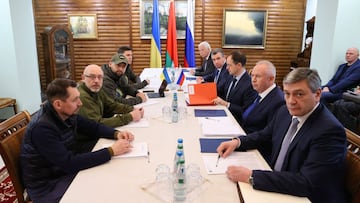Russia - Ukraine invasion: who are the representatives of each government in the negotiations?
Russian and Ukrainian delegations have been meeting to negotiate an end to the hostilities that began when Putin ordered a “special military operation.”

Officials from Russia and Ukraine are expressing cautious optimism that a compromise can be reached in the ongoing peace negotiations to end nearly three weeks of fighting.
Although each side has been speaking to the heads of state of third-party nations, no face-to-face meeting has yet been scheduled to take place between Russian President Vladimir Putin and Ukrainian President Volodymyr Zelensky.
Also see:
- Thousands of foreign fighters have landed in Ukraine creating a complex tapestry of soldiers
- What did President Zelensky say in his address to Congress?
- What is the Russian Mir card and how does the Kremlin payment system work?
- Journalist death toll rises in Ukraine
Russian delegation lead by a revisionist aide to Putin
Four days after Vladimir Putin ordered the invasion of Ukraine in what he wants called a “special military operation” to de-militarize, de-nazify and save ethnic Russians from a non-existent genocide, the Russian and Ukrainian delegations met for the first time to end hostilities. There wasn’t much hope for those negotiations given who the Kremlin sent to the negotiations which took place in Belarus just across the border from Ukraine.
Leading the Russian delegation, which included officials from the foreign and defense ministries and presidential administration, was Vladimir Medinsky, an aide to Putin. Prior to becoming an advisor to Putin on history and humanities policy in 2020, he spent eight years as Russia’s Minister of Culture. He is known for being a military enthusiast and ultraconservative nationalist firebrand, using his positions to promote inaccurate portrayals of Russia’s past.
Peskov claims Ukraine who picked Gomel as a venue for peace talks.
— max seddon (@maxseddon) February 27, 2022
He reveals the Russian delegation is headed by former culture minister Vladimir Medinsky, who grew up into Ukraine but then eventually became one of the main architects of Putin's nationalist revision of history
Given the sensitivity of the situation after Putin put the nation’s strategic deterrence on high alert any number of people from the Russian government would have been far more qualified to negotiate peace with Ukraine according to Rebecca Adeline Johnston writing for Slate. Initially the Russians were demanding that Ukrainians capitulate but the performance of the Russian forces along with the fierce resistance they’ve encountered has slowed down and stalled their advance changing the Russian negotiating stance.
The Ukrainian delegation sees Russian demands “softened significantly”
At the beginning of negotiations Russia was talking about ultimatums but has now “softened significantly” according to the head of the Ukrainian delegation for peace talks. Mykhailo Podoliak, advisor to President Zelenskyy is leading the team of Ukrainian negotiators has said despite “fundamental contradictions” between the two sides “there is certainly room for compromise,” and is confident that a ceasefire can be achieved. But he wants to see direct talks between Zelenskyy and Putin which the Kremlin says can only happen once an agreement is already hammered out in order to finalize the details.
He is joined at the table by the head of Zelenskyy’s Servant of the People party, the defense and deputy foreign ministers and the Ukrainian parliament’s People's Deputy as well as the Ukrainain deputy head to the Trilateral Contact Group formed in 2014 to resolve the conflict started by Russia’s earlier invasion and occupation of Ukraine.
Our position at the negotiations is quite specific - legally verified security guarantees; ceasefire; withdrawal of Russian troops. This is possible only with a direct dialogue between the heads of Ukraine and the Russian Federation. Details are in an interview with the @NewsHour pic.twitter.com/TlPUl3XfGK
— Михайло Подоляк (@Podolyak_M) March 16, 2022
The two sides discussed a 15-point draft proposal for peace on Monday according to the Financial Times. This is the first time a full tentative deal has been on the table which would see a ceasefire and Russian troops withdrawing from Ukraine. In return Kyiv would need to give up the idea of joining NATO and guarantee that neither foreign weaponry nor forces would be hosted on Ukrainian soil.
Both sides think a compromise could be reached
Related stories
Zelenskyy said of the negotiations that they were becoming "more realistic" and in a major shift stated that Ukraine could accept not joining NATO on the condition of international security guarantees. However, there remain many obstacles regarding such guarantees and the Ukrainian territories that Russia has recognized as independent states as well as Crimea which Putin annexed.
Russian Foreign Minister Sergei Lavrov for his part said, “there is some hope for reaching a compromise,” with the Kremlin discussing with Ukraine that it could have a status similar to that of Austria, Finland or Sweden according to Reuters. All three are members of the European Union, something which Russia has opposed for Ukraine until now, but are not members of NATO.


